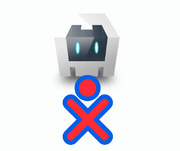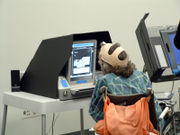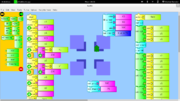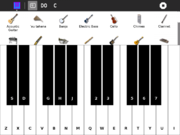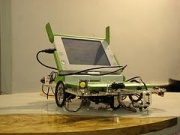Difference between revisions of "Summer of Code/2014"
m (→Sugar Core) |
|||
| Line 17: | Line 17: | ||
|- | |- | ||
! [[File:Microphone.svg|180px|left|thumb]] || Voice Interface || Martin Abente ||align=left valign=top| | ! [[File:Microphone.svg|180px|left|thumb]] || Voice Interface || Martin Abente ||align=left valign=top| | ||
| − | Speech recognition technologies are interaction mechanisms that, nowadays, have evolved from "alternative" to "extended". Proof of this is the proliferation of such technologies in a wide range of domains. From smartphones assistants, medical record | + | Speech-recognition technologies are interaction mechanisms that, nowadays, have evolved from "alternative" to "extended". Proof of this is the proliferation of such technologies in a wide range of domains. From smartphones assistants, medical-record transcriptions, smart cars, and TV command controls to many others. |
| − | In this regard, not much have been seen in the education domain. This is could be due the fact that there is still a missing glue between the speech | + | In this regard, not much have been seen in the education domain. This is could be due the fact that there is still a missing glue between the speech-recognition technologies and educational content developers. This project is about filling the gap, within the Sugar Learning Platform, and for doing so the next objectives must be fulfilled: |
| − | (a) put together a speech recognition engine that allow us to deploy it in offline scenarios. | + | (a) put together a speech-recognition engine that allow us to deploy it in offline scenarios (i.e., using PocketSphinx and Voxforge projects); |
| − | (b) define a general architecture that will allow us to provide high level speech recognition | + | (b) define a general architecture that will allow us to provide high-level speech-recognition functionality to the Sugar core and activities (i.e., exposing this engine as a DBus service); |
(c) finding acceptable solutions that will allow us to add new content and being able to handle different languages. | (c) finding acceptable solutions that will allow us to add new content and being able to handle different languages. | ||
|- | |- | ||
Revision as of 10:01, 11 February 2014
Project candidates
A list of projects potential participants might contribute within GSoC program.
- Note
- Potential mentors, please feel free to add ideas to this list. Also, feel free to add your name to a project you'd be willing to co-mentor.
- Note
- Potential students, more project ideas can be found on our Features page.
Sugar Core
| Title | Mentor | Description | |
|---|---|---|---|
| Port to Python3 | Walter Bender | There are many reasons to port Sugar to Python 3, not the least being its support for internationalization is greatly improved over Python 2. This project is self-evident. | |
| Cordova/PhoneGap container for Sugar | Lionel Laské | The idea is to allow Sugar Web Activities to use device dependent features. In this objective, the project will be to transform Sugar into a Cordova/PhoneGap container and to implement major PhoneGap features. Shortly, the project is to add Sugar as new supported platform for Cordova/PhoneGap. Lists of Sugar features that could be exposed to Sugar Web Activities using Cordova/PhoneGap will be: Camera, Audio/Video capture, Accelerometer, Connection, Events, File, Globalization, Media. During the project, the student will also have to demonstrate its work by writing some sample activities using device features. Example of activities is a Record like activity or a Level Tool like. | |
| Voice Interface | Martin Abente |
Speech-recognition technologies are interaction mechanisms that, nowadays, have evolved from "alternative" to "extended". Proof of this is the proliferation of such technologies in a wide range of domains. From smartphones assistants, medical-record transcriptions, smart cars, and TV command controls to many others. In this regard, not much have been seen in the education domain. This is could be due the fact that there is still a missing glue between the speech-recognition technologies and educational content developers. This project is about filling the gap, within the Sugar Learning Platform, and for doing so the next objectives must be fulfilled: (a) put together a speech-recognition engine that allow us to deploy it in offline scenarios (i.e., using PocketSphinx and Voxforge projects); (b) define a general architecture that will allow us to provide high-level speech-recognition functionality to the Sugar core and activities (i.e., exposing this engine as a DBus service); (c) finding acceptable solutions that will allow us to add new content and being able to handle different languages. | |
| Assistive Interface | Andres Aguirre | Using a base sensor package, the goal of this project is to provide a physical sensor interface to the Sugar desktop for people with limited motor control. |
Sugar Activities
| Title | Mentor | Description | |
|---|---|---|---|
| Turtle Art 3D | Walter Bender | Sugar is lacking any 3D programming environments. This project would be to develop such an environment. There is a rich program in 3D Logo developed by Horacio Reggini [1]. The specific project would be to write an extension to Turtle Blocks to encompass Reggini's ideas. | |
| Music Suite | Gonzalo Odiard | Sugar's primary music offering, the TamTam suite, is woefully inadequate with touch interfaces. The goal of this project is to rewrite the suite to use the underlying mechanisms demonstrated in the touch-friendly Music Keyboard activity. | |
| Video Editing Suite | Gonzalo Odiard | Sugar need a simple activity to process video. The interface should be simple and need run in a device with low resources as the xo. | |
| Assistive Robots | Alan Alguar | In conjunction with the Assitive Interface project, the goal of this project is to provide a physical sensor interface to the Sugar robots suite (Turtle Bot) for people with limited motor control. |

